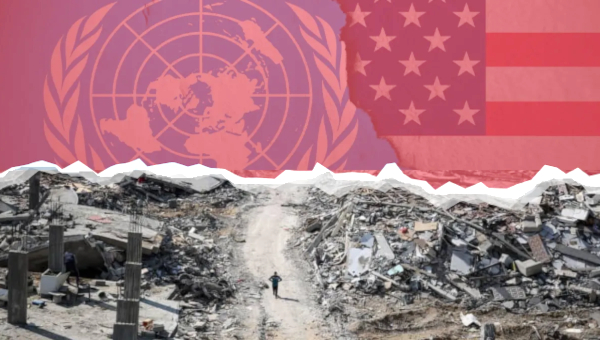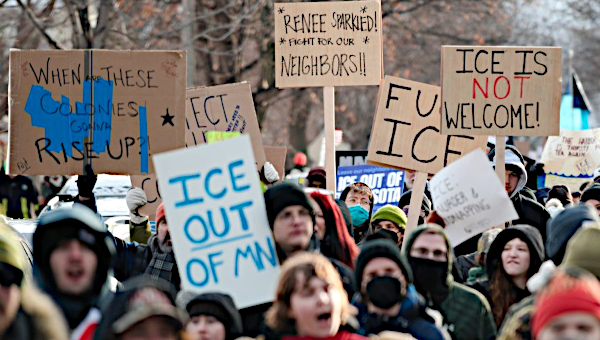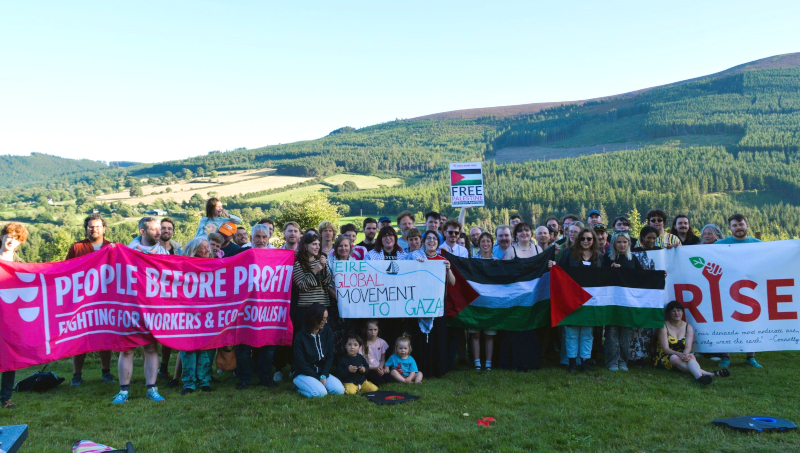Vancouver Winter Olympics: A Festival of Corporate Greed
On February 12, the corporate sporting behemoth known as the 21st Winter Olympic Games will open to great fanfare in Vancouver. In a time of economic hardship and government cuts to social programs across Canada, huge sums of public money have been spent to stage this uber spectacle.
Billions of dollars have been spent constructing venues, a new convention center and airport terminal; widening and paving untold kilometers of roads and highways; building a hugely expensive rapid transit line connecting the city’s airport to its downtown; and erecting new hotels to serve the influx of corporate sponsors and spectators.
The hotel, travel, restaurant and real estate industries hope to make a killing off the influx of out-of-town spectators and partygoers. Construction companies have already earned hundreds of millions of dollars during the years of preparation furiously pouring concrete and asphalt. The official line says there will also be lots of long-term tourism dollars to be made, though this has not happened in other host cities.
Some of the world’s largest corporations are Games sponsors, including Coca-Cola, VISA, General Electric, Samsung, and MacDonald’s. Canadian sponsors include the Royal Bank, Petro Canada, Hudson’s Bay Company and Bell. The scale of their participation during the two weeks of competition is such that they have booked entire hotels and restaurants to cater to their executives, invited guests, and assorted hangers-on.
Militarization and Clampdown on Democratic Rights
When Vancouver first submitted a bid for the Winter Olympics, the budget for “security” was said to be $175-million. The final cost will exceed $1-billion. An army of Canadian military, federal police agencies and municipal police, about 10,000 altogether, will police the city, complemented by some 5,000 security guards.
A vast network of surveillance cameras of public spaces has been installed, and barbed wire fences and other barriers are going up all over the region to keep protesters and the non-ticket holding public away from Games venues. Police have stepped up harassment and intimidation of anti-Olympics organizers across Canada, in some cases visiting homes and workplaces to interrogate not only Games’ critics but also their acquaintances.
The rationale for the overwhelming display of military and police power is the same as that used to justify the wars in Iraq, Afghanistan and Palestine – that behind every corner lurks a potential “terrorist threat” and the only way to combat that threat is to wage war. Police have warned they will arrest anyone who attempts to stage protests of the Games near venues or along key transportation routes.
The Vancouver police have acquired new weapons to deal with critics, including the Long Range Acoustical Device, a loudspeaker system first deployed against civilians in Pittsburgh last year during the G20 meeting of world political leaders. It emits a powerful sonic wave to disperse crowds. Transit police, meanwhile, will for the first time introduce dogs into the transit system to randomly sniff passengers and their belongings.
Two special laws have been adopted by the provincial government that, in cooperation with Vancouver’s city council, will “clean up” the city and curtail visible expressions of opposition to the Games.
The Assistance to Shelter Act (termed the “Olympics Kidnapping Act” by housing rights advocates) permits police to remove the homeless or other “undesirables” from streets surrounding Olympic venues and dump them at housing shelters or in other municipalities.
Bill 13 regulates public signage. It is designed to protect the Olympic trademark and those of Games sponsors, but critics say it will also be used to censor public expressions of opposition to the Games. At the University of British Columbia, for example, students in residence have been threatened with eviction if they post anti-Olympic signs in their windows. In mid-December, Vancouver city officials ordered the removal of a mural painted on the outside wall of an art gallery in downtown Vancouver – four sad faces and one happy face drawn inside the Olympics rings.
 Police have refused to say whether police infiltrators will join protests and promote violence. The issue is not a small one. At a protest of world leaders in Montebello, Quebec, near Ottawa, in 2007, infiltrators from the Quebec provincial police urged protesters to throw rocks and incited other forms of violence.
Police have refused to say whether police infiltrators will join protests and promote violence. The issue is not a small one. At a protest of world leaders in Montebello, Quebec, near Ottawa, in 2007, infiltrators from the Quebec provincial police urged protesters to throw rocks and incited other forms of violence.
One police infiltration has already come to light. When the Olympic torch arrived in Victoria, BC on October 30 to commence its cross-Canada relay spectacle, hundreds of people staged a protest drawing attention to the contrast between lavish public spending on the Games and miserly funding of social programs. Protestors blocked the relay for a time using civil disobedience tactics. Unknown persons used marbles to disrupt and potentially injure mounted police and their horses being used for crowd control, an action that protest organizers say did not come from their ranks.
One month later in Vancouver, the chief of Victoria police, James Graham, said his force had infiltrated the protest. He told an amused international security conference, “You knew that the protesters weren’t that organized when on the ferry on the way over (from Vancouver) they rented a bus … and there was a cop driving the bus.”
Garth Mullins, an organizer with the Olympic Resistance Network, told a public meeting in Vancouver in late November, “If there is violence at the Olympics, it’s going to be started by the police.” Seated as a panelist at the meeting was Bud Mercer, the head of the Vancouver 2010 Integrated Security Unit.
Border Controls
Stiffer controls at the nearby U.S.-Canada border are restricting the movements of possible Games critics. On November 25, respected U.S. journalist Amy Goodman, host of the daily Democracy Now! broadcast, was detained for several hours by Canadian border officials while on her way to a speaking engagement in Vancouver. Although the Olympics was not the subject of her talk, officials were worried it might be. They grilled her about it for several hours. Eventually, she was allowed to continue her travel, but was ordered to leave the country within 48 hours.
On December 10, Marla Renn, an organizer with the Olympic Resistance Network in Vancouver and a chairperson of the Stopwar.ca coalition, was refused entry into the United States while on her way to Olympics-related speaking engagements in Portland, Oregon. She was searched, photographed, fingerprinted and grilled for six hours about her political views and her contacts in the United States. Her cell phone was taken and accessed, and her books and speaking notes were read and copied.
After that interrogation, she was delivered to Canadian authorities who subjected her to their own interrogation for several more hours. U.S. authorities ordered her not to return to the United States under threat of detention.
In an account of her treatment published in the weekly Georgia Straight, Renn wrote:
“My refused entry to the U.S., accompanied by interrogation, intimidation, and harassment by officials on both sides of the border, demonstrated once again how $1-billion in Olympic security is designed to stifle dissent, even the public-speaking variety, and not to ensure public safety as is officially claimed.”
Concern about the conduct of the Olympics security force is especially warranted because of the epidemic of police violence sweeping Canada in recent years. Tasers have caused dozens of deaths at police hands, including the RCMP killing of Robert Dziekanski at the Vancouver airport in October 2007 that was captured on amateur video and broadcast around the world.
Deaths by police gunshot and common assault by police are on the rise. In British Columbia alone there were 960 formal complaints of police misconduct in 2009.
Meanwhile, the weak and ineffective RCMP Public Complaints Commission was effectively shut down by the federal government on December 31 when the four-year term of chair Paul Kennedy ended. His appointment was not renewed nor has a replacement been named. Kennedy recently issued a report highly critical of the RCMP’s conduct in the killing of Dziekanski.
War Games
Olympic games have always been a showcase for the militarism of host countries. The Canadian Armed Forces, now engaged in a ruthless and predatory war in Afghanistan, is prominently featured in the preparations of these games. Its vehicles routinely accompany the Olympic Torch Relay as it winds its way across Canada. Soldiers will be on the streets of Vancouver throughout the competition. Helicopters and aircraft fighters have been practicing “security” missions in the skies above the city for months. It’s rumoured that the opening ceremonies will pay tribute to Canada’s war in Afghanistan.
By tradition, host countries of Olympic games issue calls for cessation of military hostilities and promotion of the “ideals of peace” for the duration of the event. A resolution to this effect was introduced by Canada to the United Nations and approved on October 19 – but the government of Canada has made no commitment to observe a truce in Afghanistan in February.
Social Housing a Victim of the Games
Vancouver’s controversial bid for the Games was launched in 1999 by a provincial NDP government and a federal Liberal Party government. To sell the bid to a wary population, the Games were dressed up as a socially responsible event that would improve the city’s sporting facilities, build new modes of public transit, employ “green” construction techniques, and above all expand the stock of social housing.
Metropolitan Vancouver has a chronic housing crisis that sees thousands of people living without a roof over their head and thousands more living in precarious or squalid conditions. The city has the highest cost of housing and shelter in Canada. The first and foremost concern about these Games was always that poor people living in rooming houses would be evicted by landlords intent on sprucing up their facilities and renting them to Games visitors at inflated prices. A related concern was the expenditure of vast sums of public funds on a sporting event instead of social needs.
A pall of uncertainty hung over the bid even after it was awarded in the summer of 2003. The uncertainty was only lifted after deft maneuvering by municipal politicians in the months that followed. Vancouver mayor Larry Campbell (since appointed to the federal Senate) blocked with two right wing counsellors of the conservative NPA party and three counsellors of the progressive COPE party to hold a non-binding plebiscite on the Games. The yes side won 64 percent – but only 46 percent of eligible voters took part and voting was restricted to the City of Vancouver, ignoring the wider metropolitan region, let alone the province.
The yes side enjoyed the endorsement of the opposition New Democratic Party and most of its trade union affiliates. Proponents of the Games within the labour and social rights movements argued that support could “leverage” promises from the provincial and federal governments for increased social spending. Yet once the plebiscite was in the bag, the vague promises by governments to build housing for Vancouver’s poor and homeless population were tossed aside.
The last in a string of abandoned housing promises was the decision in early 2009 by a new city administration (composed in its majority of a right-wing split from COPE) to cancel the social housing content of the Athletes’ Village, now deemed too expensive. The Village, located in downtown Vancouver, will instead be converted to luxury condominiums after the Games. (A remnant of social housing in the form of subsidized rents for some units is still being debated.)
Outrageously, the Village then required a half billion financing guarantee from the City of Vancouver before it could be completed. Fortress Investment Group of New York refused to continue its financing for the project, a consequence of U.S. financial collapse.
The onset of the economic crisis in September 2008 triggered a new wave of cuts to social programs by the provincial government (see Socialist Voice, October 5, 2009). This is the main reason why public support to the Games in the host province has been steadily declining.
Public Transit:
Another Victim of Broken Olympics Promises
Another victim of broken Games promises is public transit. Most local politicians and transit experts agree that public transit priorities are a rapid service to the northeast of the city, creation of rail service to suburbs in the Fraser River Valley, and substantial expansion of bus service. However, Olympic priorities dictated construction of a rapid transit line connecting the downtown to the airport, at a cost of $2-billion, or $110-million per kilometer. Vancouver’s transit authority, Translink, says the Canada Line and other road and highway expansion has exhausted funds for any new transit projects. Meanwhile fares continue to rise. They have risen 40 per cent in the past eight years.
In November, 2009, the chief executive officer of Translink, Thomas Prendergast, abruptly resigned after 15 months on the job. He gave no explanation for the decision, but Gordon Price, a respected transportation planner and writer, commented that Prendergast “looked at the situation, saw this wasn’t going anywhere and said ‘What am I doing here?’”
Price summed up the Vancouver region’s transportation policy in a commentary in the November 13 Vancouver Sun, “We’re going full speed ahead, backwards. To the world of the 1950’s and 60’s, when we assumed that we would be driving everywhere for everything, and went out and built it that way. Now, in most of the region, we’re doing it again.”
Protests Planned
Despite all the threats and obstacles, protests against the Olympic Games and its scandalous public funding have begun and will continue throughout.
The Olympic torch relay has met protests in many towns and cities across the country. A key theme of protest has been the deplorable conditions and ongoing violations of the rights of Canada’s Indigenous population, including those living in urban areas. The Olympic Resistance Network (ORN) launched its work in Vancouver several years ago under the theme “No Olympics on Stolen Indian Land” to highlight the fact that much of the land on which the Games will take place is unceded Indigenous territory.
One torch relay protest in Nairn Center, northern Ontario blockaded the Trans Canada Highway on January 2 as the torch procession approached. Eight young people were arrested and then later released. One of them, Mark Corbiere from the Anishinabe people, stated in an ORN press release:
“VANOC [the Vancouver Olympic organizing committee] and the government of Canada can no longer whitewash Canada’s brutal legacy of ongoing colonialism, nor its abysmal environmental record; these are the things Canada and VANOC really represent, and we will not let them use the Olympic spotlight to put their lies unchallenged before the global public.”
A demonstration will take place in Vancouver to coincide with the opening of the Games on February 12. It is being organized by the 2010 Welcoming Committee and its sponsoring and participating organizations, including the ORN. Scores of public information and protest meetings and rallies have been held in the months leading up to the Games.
The BC Civil Liberties Association has played a leading role in drawing attention to the violations of civil rights accompanying the Games. It is organizing teams of legal observers that will observe political protests as well as other places and events that might experience police misconduct.
One event to take place on February 14 is shaping up as a confrontation with Olympics officials. It is an annual march through the streets of Vancouver to commemorate the scores of Aboriginal women who have disappeared over the past decades in Canada and are presumed to have met violent deaths. The traditional march route overlaps Olympic no-go zones. March organizers say they will not change the traditional route to meet the whims of Olympic officials.
The two week Olympic spectacle will leave in its wake a legacy of financial debt, deepening impoverishment, violations of civil and social rights, and a significant reinforcement of the tools and weapons of the national security state. What’s more, five weeks before the Games’ opening comes news of yet another Olympic spending boondoggle in the making–Intrawest Corporation, the owner of the Whistler ski resort where most of the Games’ downhill events will take place, located 100 km north of Vancouver, is in financial default and may require hundreds of millions of dollars of emergency bailout.
Such a legacy deserves to be challenged. •
Resources
For more information on protest actions against the Olympic Games:
- Olympic Resistance Network
- No Vancouver 2010 Winter Olympics On Stolen Native Land
- For more about the history of the Olympic Games, read Five Ring Circus: Myths and Realities of the Olympic Games, by Vancouver author Chris Shaw.





